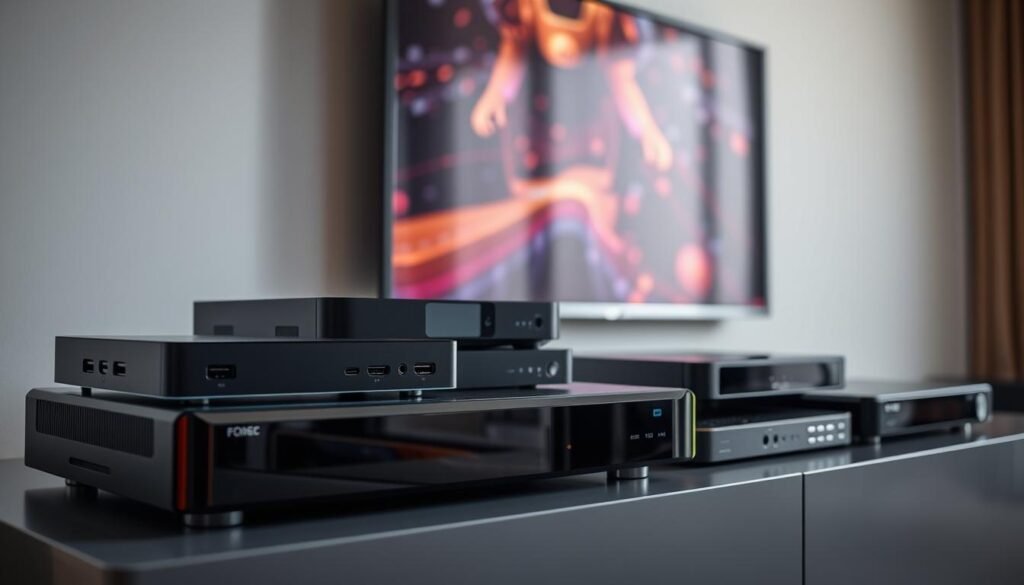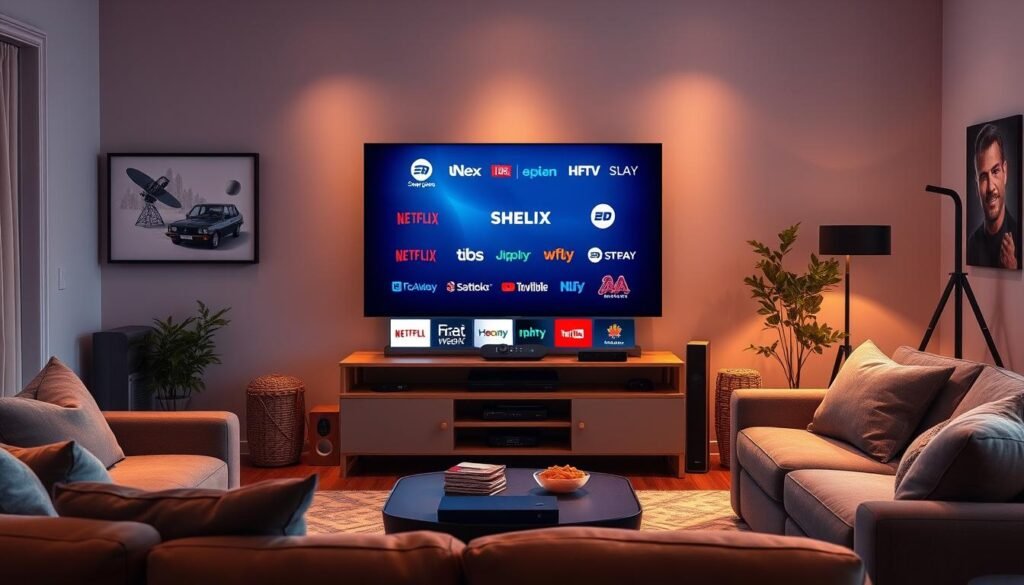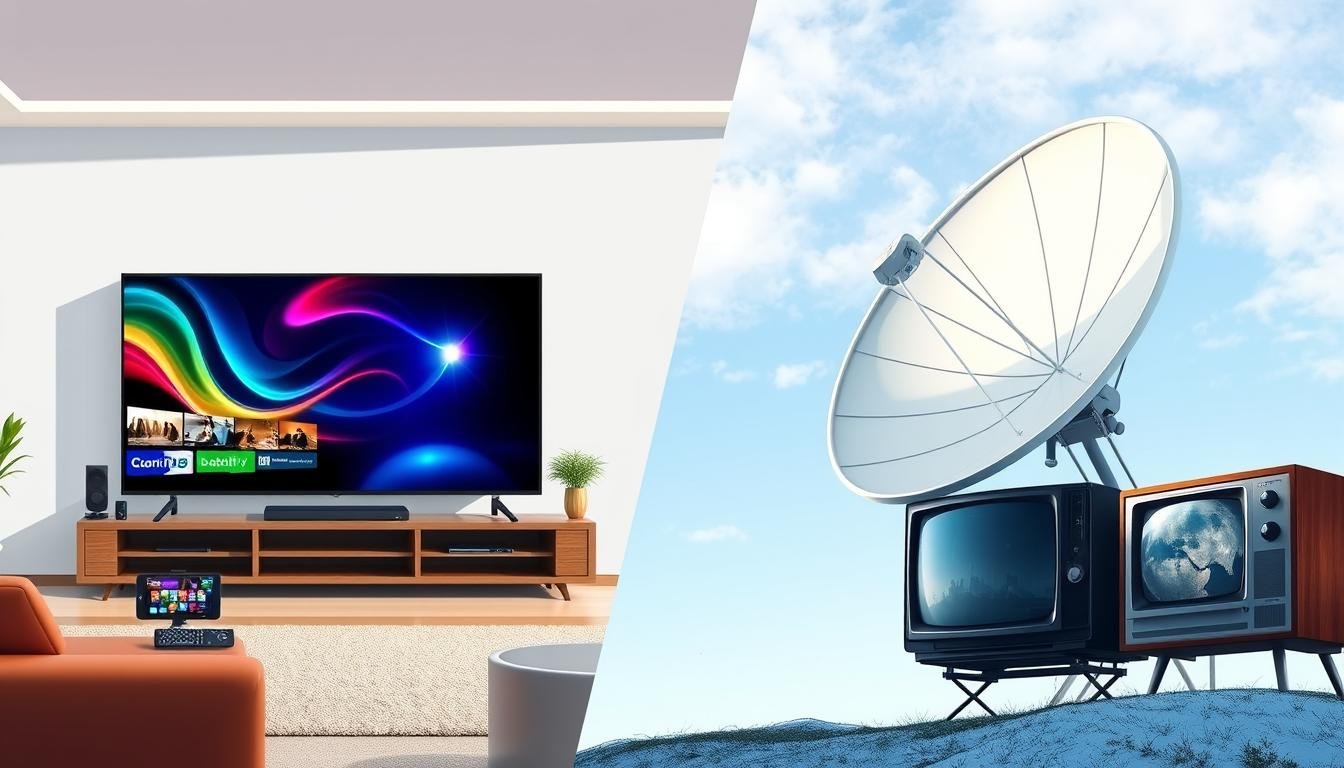In today’s fast-changing TV world, choosing between IPTV and satellite TV is key. People want cheaper and more flexible TV options than traditional cable. This detailed look will help you understand the good and bad of both IPTV and satellite TV. It will guide you in picking the best choice for your viewing habits and budget.
Key Takeaways
- Explore the fundamental differences between IPTV and satellite TV
- Understand the cost-benefit analysis of each service, including setup costs and monthly fees
- Discover the unique features and capabilities that set IPTV and satellite TV apart
- Evaluate the quality of service, content variety, and user experience for both options
- Assess the accessibility and scalability of IPTV and satellite TV in the UK
Understanding IPTV: Features and Benefits
In today’s fast-changing world of digital entertainment, Internet Protocol Television (IPTV) is a big leap forward. It changes how we watch internet television for the better. This new tech gives us a smooth and engaging viewing experience, meeting the needs of today’s viewers.
What is IPTV?
IPTV, or Internet Protocol Television, is a new way to watch TV over the internet. It’s different from old TV systems that use broadcast or satellite. IPTV sends high-quality video and sound straight to your devices, like smart TVs, computers, or phones.
Key Features of IPTV
- On-demand content: IPTV has lots of programmes, movies, and live events ready to watch whenever you want.
- Multi-device compatibility: You can watch IPTV on many devices, making it easy to watch anywhere, anytime.
- Personalised user interfaces: IPTV lets you change how you see things, making it your own.
- Flexible pricing models: IPTV has different plans for everyone, fitting all kinds of budgets and watching habits.
Benefits of Choosing IPTV
IPTV has brought many good things to viewers, changing how we watch digital broadcasting and OTT platforms. Here are some of the main benefits:
- Enhanced video and audio quality: IPTV gives you HD and even UHD content, making your viewing experience amazing.
- Convenient on-demand access: You can pause, rewind, and record live TV, and watch lots of on-demand content too.
- Improved interactivity: IPTV lets you do more, like get extra info on shows, vote in polls, or control your home.
- Cost-effective solutions: IPTV is often cheaper than cable or satellite TV, making it great for those watching their budget.
As digital entertainment keeps getting better, IPTV is leading the way. It’s changing how we watch internet television and offering lots of cool features and benefits for today’s viewers.
| Feature | Benefit |
|---|---|
| On-demand content | Let’s you watch your favourite shows and movies whenever you like, without being tied to TV schedules. |
| Multi-device compatibility | Means you can watch IPTV on lots of devices, like smart TVs, phones, tablets, and computers, for a consistent experience. |
| Flexible pricing models | IPTV has different plans for everyone, so it’s more affordable and accessible to more people. |
“IPTV has revolutionised the way we consume digital content, offering unparalleled convenience, flexibility, and quality to modern-day viewers.”
Satellite TV Explained
Satellite TV uses satellites in space to send digital signals to dish antennas at homes. This method helps reach remote areas where internet is hard to get. It’s a good choice for those without fast internet.
How Satellite TV Works
First, a central facility sends programming to a satellite in space. The satellite then sends the signals back to dish antennas. A receiver at home decodes the signals and shows them on TV. This ensures a good viewing experience, even in tough locations.
Key Features of Satellite TV
- Wide coverage area: Satellite TV can reach remote and rural locations that may be difficult to serve with traditional cable or IPTV.
- Consistent signal quality: The digital broadcasting technology used by satellite TV providers ensures a stable and high-quality image, regardless of location.
- Diverse channel selection: Satellite TV often offers an extensive range of national and international channels, catering to a wide variety of viewer preferences.
Advantages of Satellite TV
Satellite TV is great for areas hard to reach by other TV services. It offers many channels and is flexible. But, setting it up can be tricky, and it costs more than IPTV at first.
| Feature | Satellite TV |
|---|---|
| Signal Transmission | Utilises dish antennas and satellites to deliver digital signals |
| Coverage Area | Wide, reaching even remote and rural locations |
| Channel Selection | Typically offers a diverse range of national and international channels |
| Image Quality | Consistent and high-quality due to digital broadcasting technology |
| Installation | May require more complex setup compared to IPTV |
Cost Comparison between IPTV and Satellite TV
Choosing between IPTV and satellite TV depends a lot on cost. This section looks at the setup costs, monthly fees, and extra expenses for both services.
Initial Setup Costs
IPTV setup costs vary by provider and equipment needed. You might need a set-top box or a smart TV, costing £50 to £200. Satellite TV, however, requires a dish and receiver, costing £100 to £400, including installation.
Monthly Subscription Fees
IPTV monthly fees are often lower, from £10 to £30. This depends on channels, on-demand content, and extra features. Satellite TV, though, charges more, from £20 to £50, for more channels and premium content.
Additional Expenses
Both IPTV and satellite TV have extra costs. IPTV needs a fast internet connection, while satellite TV might require equipment upgrades or maintenance. These costs should be considered when comparing the two.
| Feature | IPTV | Satellite TV |
|---|---|---|
| Initial Setup Costs | £50 – £200 for set-top box or smart TV | £100 – £400 for satellite dish and receiver, including installation |
| Monthly Subscription Fees | £10 – £30 per month | £20 – £50 per month |
| Additional Expenses | High-speed internet connection | Equipment upgrades and maintenance |
Understanding these costs helps you decide which service is more cost-effective. It depends on your viewing habits and budget.
Quality of Service: IPTV vs Satellite TV
Choosing between IPTV and satellite TV for digital broadcasting depends on service quality. Both have their strengths, but how do they compare in video quality, signal reliability, and customer support?
Video Quality and Resolution
IPTV can offer top-notch video quality with the right internet. It can provide clear, high-definition video, matching satellite TV’s best. It even goes up to 4K for an immersive experience.
Satellite TV is known for its stable signal and quality. Its direct connection means less interference, giving a consistent picture, often in high-definition.
Reliability and Stability
Satellite TV is famous for its reliability. Its signal isn’t affected by weather or local issues. This means users get uninterrupted service, even in remote areas.
IPTV’s quality depends on the internet. While internet is getting better, users might still face buffering or signal drops. This can happen during busy times or in areas with bad infrastructure.
Customer Support
Both IPTV and satellite TV aim for great customer support. IPTV is quick to respond and can fix issues remotely. Satellite TV might take longer or need a technician visit.
Choosing between IPTV and satellite TV depends on your needs. Each has its own strengths and weaknesses. Think about what matters most to you for your digital broadcasting.
| Feature | IPTV | Satellite TV |
|---|---|---|
| Video Quality | Excellent, up to 4K resolution | Excellent, high-definition |
| Reliability | Dependent on internet connection stability | Highly reliable, unaffected by weather or infrastructure |
| Customer Support | Responsive, remote troubleshooting | Traditional, may require on-site visits |
“The quality of service is a critical factor in the digital broadcasting landscape, as it directly impacts the viewer’s experience.”
Content Variety: IPTV vs Satellite TV
When we look at IPTV and satellite TV, the content selection is key. Both offer live channels, on-demand shows, and a mix of local and international content. Each has its own strengths.
Channel Availability
IPTV has a huge range of live TV channels. It covers many genres and interests. Thanks to the internet, IPTV can offer a wide variety of streaming services, video on demand, and OTT platforms.
On-Demand Content
IPTV is great for on-demand content. You can watch movies, TV shows, and documentaries whenever you want. This makes it perfect for those who like to watch what they want, when they want.
Local vs International Programming
- Satellite TV is good for international channels. It meets the needs of viewers from different cultures.
- IPTV focuses more on local and regional content. This ensures viewers get content that’s relevant to their community.
Choosing between IPTV and satellite TV depends on what you prefer. Knowing what each offers helps you decide based on your entertainment needs.
| Feature | IPTV | Satellite TV |
|---|---|---|
| Channel Availability | Extensive catalogue of live TV channels, including a wide range of streaming services, video on demand, and OTT platforms. | Strong selection of international channels, catering to diverse cultural preferences. |
| On-Demand Content | Vast library of on-demand movies, TV shows, and documentaries for a personalised viewing experience. | Limited on-demand content compared to IPTV. |
| Local vs International Programming | Stronger focus on local and regional programming, ensuring relevant content for the immediate community. | Robust selection of international channels, catering to diverse cultural backgrounds. |
User Experience: Navigating Interfaces
The way we interact with set-top boxes, OTT platforms, and digital broadcasting services is key. IPTV and satellite TV have different approaches to design. They cater to various tastes and needs.
Ease of Use
IPTV systems are known for their easy-to-use interfaces. They have on-screen menus, search functions, and recommendations. This makes finding and watching programmes simple.
Customisation Options
- Satellite TV has a traditional interface, focusing on channels and linear programming. Yet, many providers now offer customisation. This includes favourites lists, parental controls, and picture-in-picture.
- OTT platforms are flexible, allowing users to personalise their experience. They can adjust settings, manage profiles, and access lots of on-demand content.
The ease of navigating set-top boxes, OTT platforms, and digital services is vital. It helps decide which service fits an individual’s viewing habits best.
“The user interface is the gateway to a viewer’s entertainment experience, and providers who prioritise intuitive design and customisation options are likely to have a significant advantage in the market.”

Installation Process: What to Expect
Setting up your entertainment solution, whether it’s internet television or satellite TV, can seem daunting at first. But with the right guidance, it can be smooth and straightforward. Let’s look at the key steps to get your IPTV and satellite TV services up and running.
IPTV Installation Setup
Installing an IPTV service needs just a few pieces of hardware. You’ll need a stable internet connection and a compatible set-top box or dish antennas. The setup is simple: just connect the set-top box to your TV and router. Many IPTV providers offer easy instructions or professional installation services for a smooth start.
Satellite TV Installation Steps
Setting up a satellite TV system is more involved. You’ll need a satellite dish installed, which might need a pro. The dish must be aligned and connected to a satellite TV set-top box. This can be tricky, especially with terrain or obstructions that can block the signal.
| Feature | IPTV Installation | Satellite TV Installation |
|---|---|---|
| Hardware Required | Set-top box, internet connection | Satellite dish, set-top box |
| Complexity | Simple, user-friendly | More complex, may require professional assistance |
| Time Investment | Relatively quick setup | Can take longer due to dish installation |
Both IPTV and satellite TV installation can be done with the right help. Knowing the details of each service helps you choose what’s best for you and your skills.
Scalability: Expanding Your Options
Technology keeps getting better, and so do our viewing options. Whether you choose IPTV or satellite TV, there are many ways to make your entertainment better. Let’s look at how you can grow your viewing experience.
Upgrading IPTV Services
IPTV is flexible and easy to change. It’s great because you can upgrade to get more channels and better video quality. You can also add premium streaming services, more cable alternatives, or advanced OTT platforms. Upgrading is simple, so you can easily improve your IPTV experience.
Options for Expanding Satellite TV
Satellite TV is more traditional but still has room to grow. You can add extra channels or packages to fit your interests. This might include sports, international shows, or special content. Some systems even let you add streaming services, giving you more cable alternatives and OTT platforms.
| Feature | IPTV | Satellite TV |
|---|---|---|
| Scalability | Highly scalable, easy to upgrade services | Moderately scalable, additional packages and channels available |
| Content Expansion | Access to a wide range of streaming services, cable alternatives, and OTT platforms | Ability to add specific channel packages and integrate streaming services |
| Flexibility | Highly flexible, with the option to customise your viewing experience | Moderately flexible, with some customisation options available |
In conclusion, both IPTV and satellite TV let you grow your viewing options. They meet the changing needs of viewers. Knowing what each service offers helps you choose the best for your entertainment.
Rural Accessibility: Which is Better?
Accessing TV in rural areas is a challenge. Both IPTV and satellite TV have their strengths and weaknesses. Knowing what each offers can help people in remote areas choose the best for their entertainment.
Availability of IPTV in Rural Areas
IPTV’s reach in rural areas depends on local internet signal transmission quality. Where internet is fast and reliable, IPTV is a good choice. It brings a wide range of internet television and on-demand content. But, in areas with bad internet, IPTV’s quality and reliability suffer.
Satellite TV Coverage
Satellite TV is more common in rural areas. It uses dish antennas and doesn’t need internet. This means even the most isolated places can get lots of TV channels. Satellite TV is a solid choice for those without fast internet.
Choosing between IPTV and satellite TV in rural areas depends on several factors. These include location, internet access, and personal taste. By considering these, rural residents can pick the best option for their entertainment and accessibility needs.
Potential Limitations of Each Service
Choosing between streaming services, satellite TV, and traditional cable TV has its challenges. Each option has its own set of limitations. It’s important to understand these before making a choice.
Internet television (IPTV) and satellite TV both have benefits. But, they also have drawbacks that users should know about.
Drawbacks of IPTV
IPTV heavily relies on a strong internet connection. If the internet is unstable, it can ruin the streaming quality. Also, IPTV might face legal issues due to piracy, especially if providers offer unauthorised content.
Drawbacks of Satellite TV
Satellite TV can be affected by bad weather. Rain or snow can disrupt the signal and cause service interruptions. The need for an outdoor dish is another drawback, especially in urban areas with little outdoor space.
When deciding between IPTV and satellite TV, consider their pros and cons. Think about your specific needs and preferences. This will help you choose the best option for your home.

Future of Television: Trends and Predictions
The digital world is changing fast, and TV is set for a big shift. OTT platforms and changing viewer habits in the UK are key to this change.
The Role of Streaming Services
Services like Netflix, Amazon Prime Video, and Disney+ are changing TV. They offer lots of on-demand content and tailor it to what you like. As they grow, they’ll become even more important in TV’s future.
The Evolution of Viewing Habits
UK viewers are changing how they watch TV. They like the ease of video on demand and watching on different devices. This means TV providers must adapt to keep up with what viewers want.
The future of TV will be shaped by OTT platforms, digital broadcasting, and changing viewer habits. For IPTV and satellite TV to stay ahead, they must keep up with these trends.
Making the Right Choice for You
Choosing between IPTV and Satellite TV needs careful thought. You must consider your needs, what you like, and your budget. Each service has its own benefits, and the best one depends on your location, how you watch TV, and what features you want.
Factors to Consider
When picking between IPTV and Satellite TV, think about a few important things. Look at the setup costs, monthly fees, and the variety of content. Also, consider the video quality and how easy it is to use. Where you live and how reliable the service is also matters a lot.
Final Thoughts on IPTV and Satellite TV
TV is changing, with more streaming services and different ways to watch. Both IPTV and Satellite TV are good options compared to old cable TV. Your choice depends on what you need and like. By looking at the good and bad of each, you can pick the best for you and your budget.

